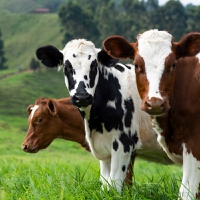

Austrianova and ProAgni are coming together to develop and commercialize shelf-stable probiotic additives for cattle feed and other farm animals through the “Bac-in-a-Box” technology. The licensing and manufacturing agreement eyes improved production efficiency, reduced methane emissions and less antibiotic use in livestock by leveraging novel, ethical and sustainable products.
The “Bac-in-a-Box” technology developed by Austrianova, a Singaporean biotech company, efficiently protects bacteria from stomach acid and allows storage at room temperature “without appreciable loss of viability.”
“The Austrianova team is excited to be extending the scope of our collaboration with ProAgni, one of our most trusted partners, in the field of enhancing the microbiome of farm animals, states professor Walter H. Gunzburg, chairman of Austrianova.
“Both companies have worked hard to create a detailed road map of the next steps in our joint activities as part of this agreement,” he highlights.
Lachlan Campbell, CEO of ProAgni, states: “The ability to shelf stabilize a wide range of ruminal bacteria is a game changer. We are pleased with the proven advantages that Bac-in-the-Box brings to this, and based on this, we are advancing our innovative lead product to the market together with Austrianova.”
Food Ingredients First recently reported how ruminant livestock – cattle, sheep and goats – is the largest methane emission source in global food systems and the sector where the most significant economic value can be generated through innovation.
Bac-in-a-Box- Encapsulation for better storageThe “Bac-in-a-Box” technology protects bacteria from stomach acid and allows storage at room temperature.
(Image credit: Austrianova).
Bac-in-a-Box is a protective device adapted for the “encapsulation of probiotic bacteria” where it has human food and animal feed applications due to its ability to “extend storage” under lyophilized conditions and protects encapsulated bacteria from getting destroyed by stomach acid.
ProAgni, a livestock feed supplement supplier based in Australia but also active in the US, has rights and access to several bacterial strains active in the rumen.
ProAgni’s bacterial strains exhibit “significantly improved” storage at room temperature and delivery of “greater numbers” of living bacteria when encapsulated with the Bac-in-a-Box technology. Furthermore, a controlled and “independently” monitored field trial in cattle has shown storage and enhanced efficacy through this technology.
The intensification of the relationship between the companies is based on the positive data generated from a field trial of Bac-in-a-Box encapsulated, strictly anaerobic bacteria in cattle that showed an enhanced shelf life, improved delivery of the bacteria to the rumen to enhance the microbiome and raised production efficiency in the form of weight gain.
The approach to modify the rumen has the potential to be applied to methane reduction.
Last year, Food Ingredients First shed light on a Nature study highlighting how upcycling can offset competition between livestock and aquaculture fodder production and the F&B industry.




